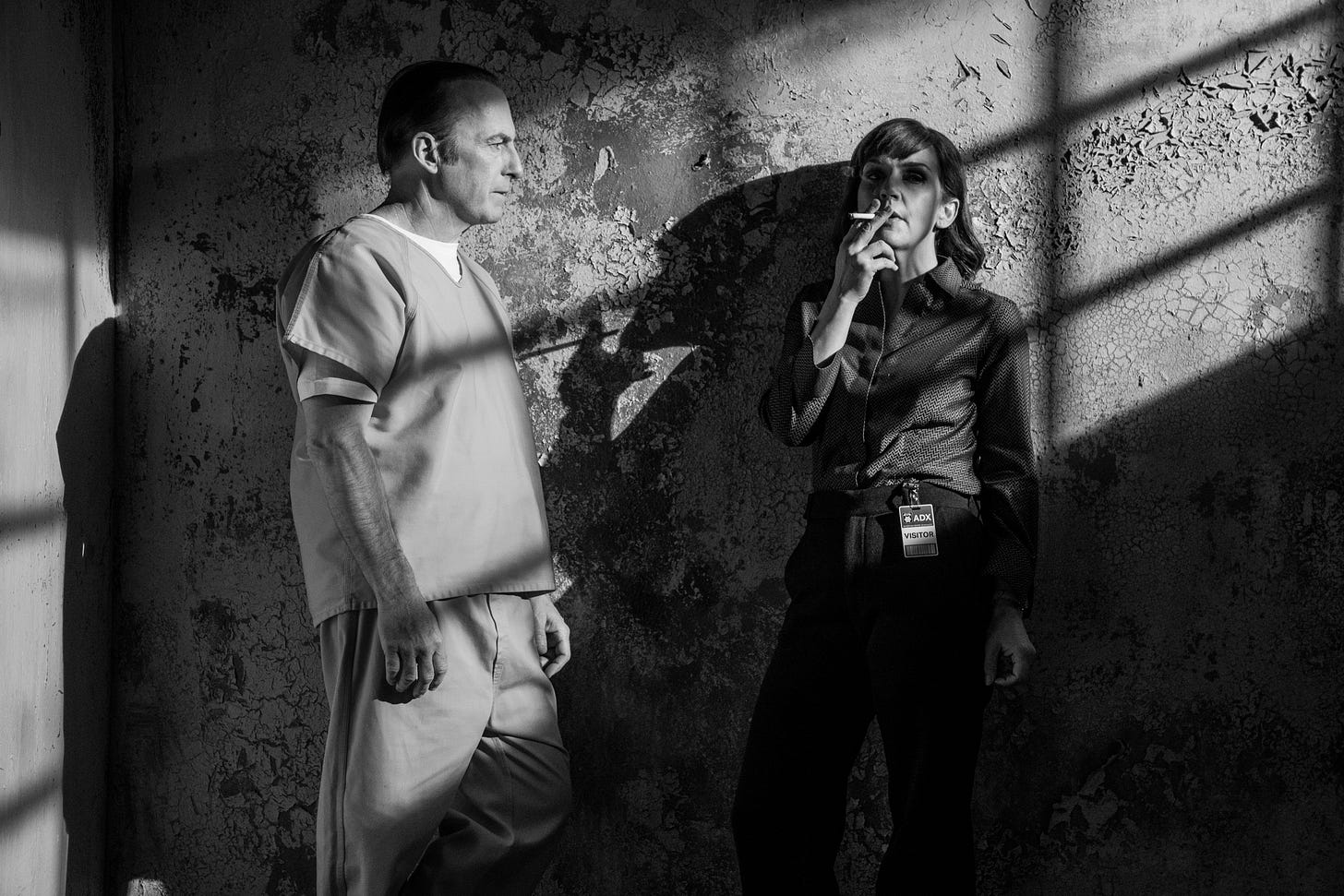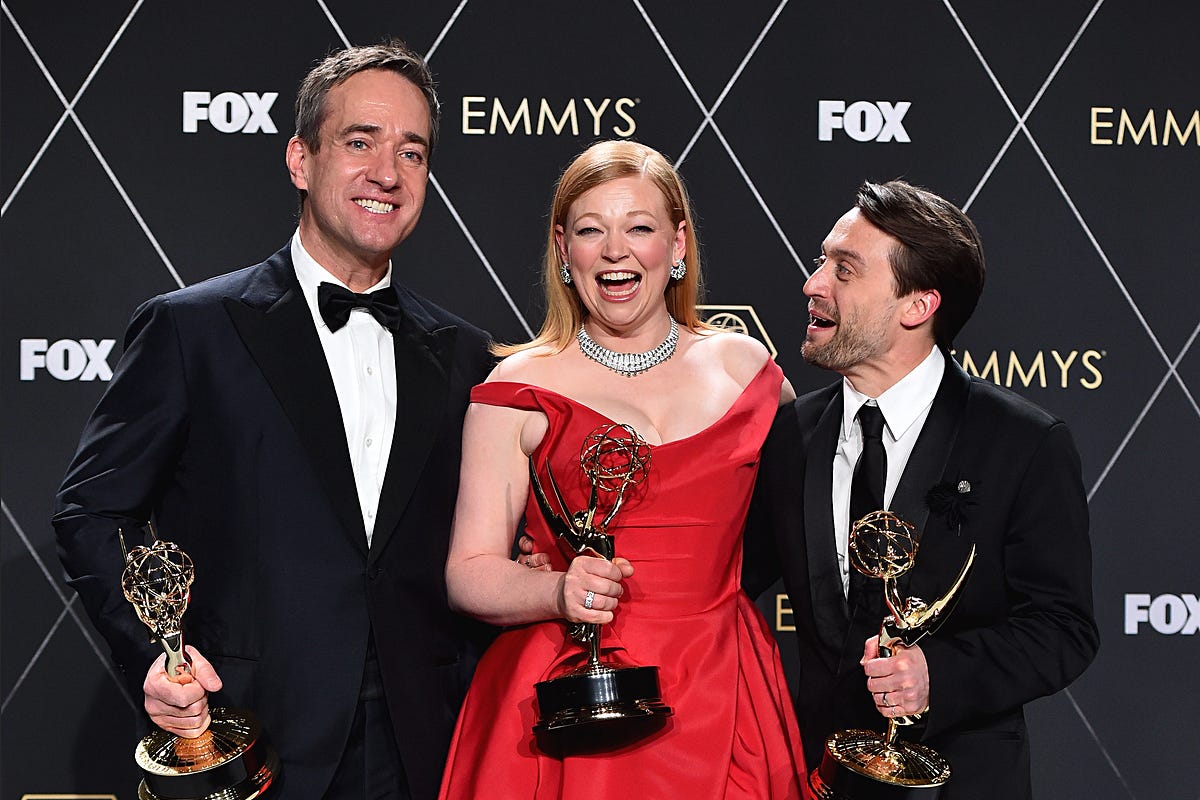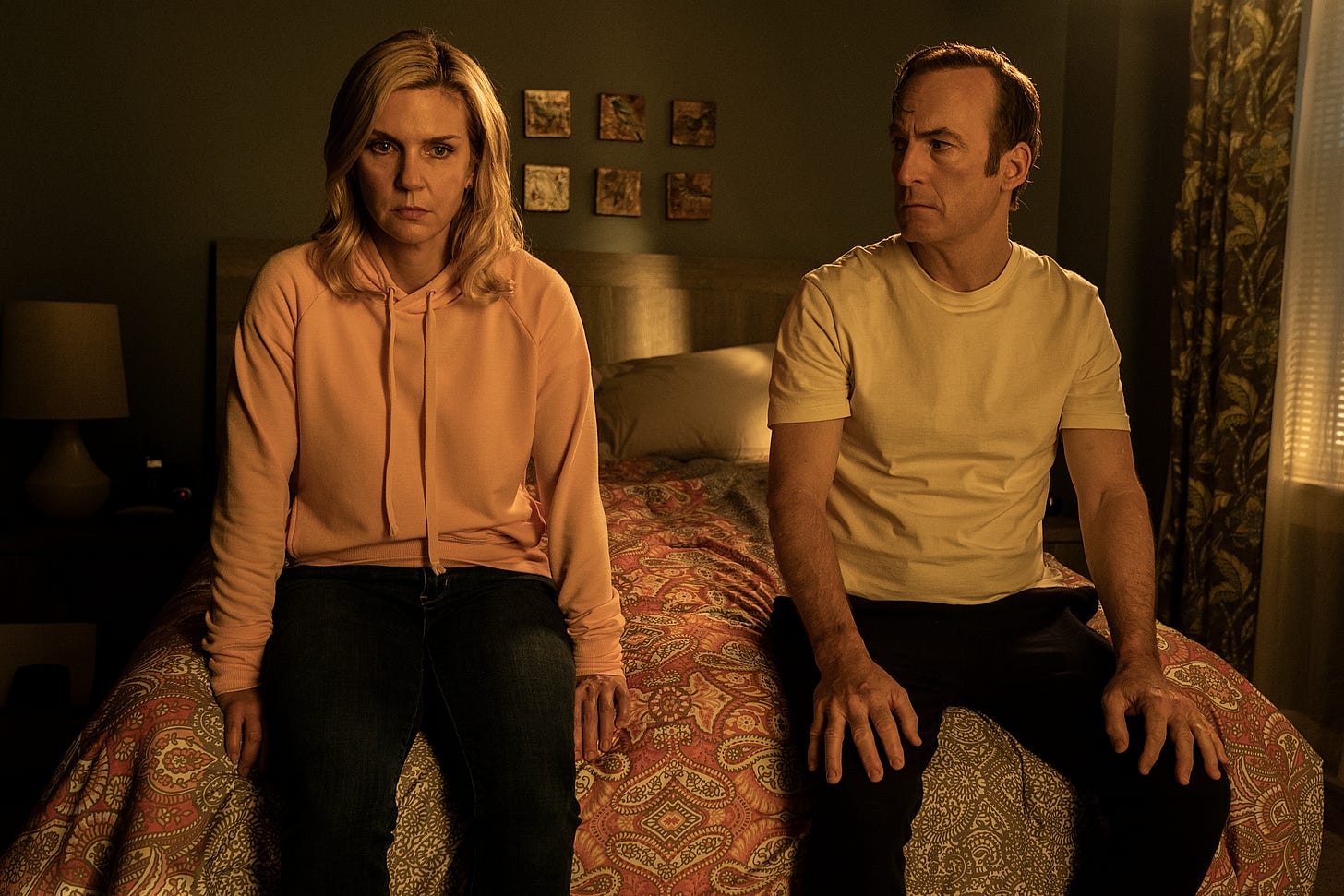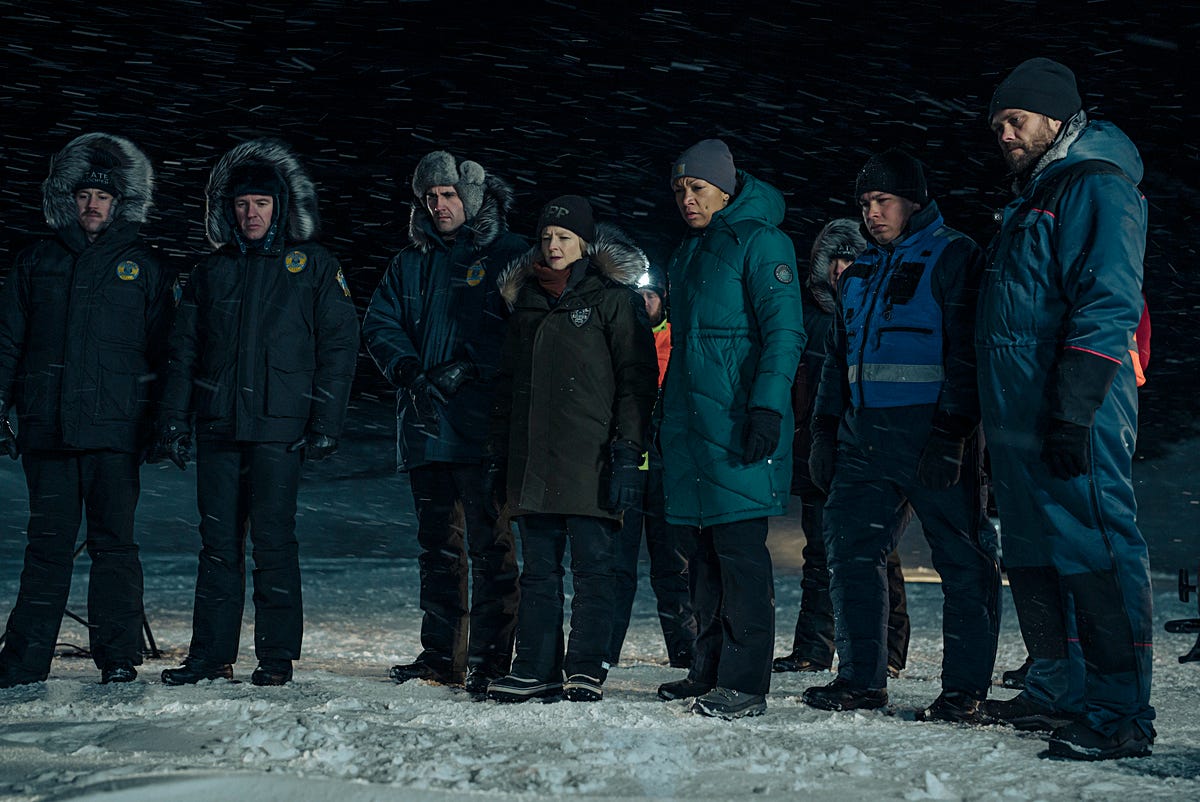How 'Better Call Saul' made bad Emmy history
The Emmys have a (new) repetition problem, 'Fargo' ends, 'True Detective' begins, and more
This week’s What’s Alan Watching? newsletter coming up just as soon as I see a man in a dress with a haircut like the Three Stooges…
Successions and Beefs and Bears, oh my!
The Emmys are different from most other awards shows, because the same series and people are eligible for years and years. In the past, this led to the problem of many of the same winners repeating, year after year. (On occasion, it meant that a serial winner, like Candice Bergen, dropped out of the race altogether after a while, just to give other people a chance.) It could often make the awards feel predictable, but there was also no ideal solution. If James Gandolfini, or Elizabeth Moss, was the best actor on television in a given year, why should we pretend somebody else was, right?
Recently, though, the predictability problem has evolved into a new form. Monday night’s 75th Primetime Emmy Awards became the third ceremony out of the past four where one show apiece dominated the comedy, drama, and limited series categories. We’ve gone from voters having their favorites from year to year to people essentially voting a party line ballot, where if they think The Bear or Succession is the best show in a particular genre(*), then they just choose it in every possible category in that genre.
(*) Never mind that The Bear is more arguably a drama than a comedy, that Succession is a satire, as its creator Jesse Armstrong said on Monday night, that we’ve had several ongoing series compete and win in the limited series categories, etc. That’s a whole other mess we can talk about some other time.
This Emmy telecast was very entertaining in many ways, as the effort to pay tribute to 75 years of great television led to a lot of fun reunions, a lot of palpable emotion (starting with Christina Applegate sobbing in Anthony Anderson’s arms when she was greeted with a standing ovation), and a general level of energy that’s so rarely present in recent awards shows. But the inevitability of The Bear, Succession, and Beef sucked all the suspense out of things. And when this keeps happening — even the 2021 show didn’t spread the wealth that much — it becomes an issue in need of addressing, which I wrote about at length on Tuesday morning. (Somehow, the show did a better job capturing the breadth of great TV over 75 years than it did over one.) I’m just not sure what the answer is, though someone on BlueSky had the intriguing suggestion of doing two Emmy ceremonies per year, which would at least do a better job of acknowledging how much good TV is out there. But even there, I imagine we’d get the same kinds of surprise-free ceremonies, just twice as many.
Saul snubbed
It feels worth a separate discussion that Better Call Saul set an ignominious record on Monday night, finishing its six-season run by getting zero wins after 53 nominations.
This is an embarrassing result for the Emmys. Just embarrassing. Better Call Saul is an all-time great show, with so much award-worthy work, and the voters obviously knew it existed, given all those nominations. I do not like the fact that Rhea Seehorn and Bob Odenkirk never won a single Emmy for their incredible performances, but lots of iconic performances never won Emmys: Jackie Gleason didn’t win for The Honeymooners, Jason Alexander didn’t win for Seinfeld, and Amy Poehler didn’t for Parks and Recreation. It happens. But when nobody who worked on a show this great ever wins? When Jonathan Banks and Giancarlo Esposito fail to win across two different series? When the writers, directors, etc, are ignored? When the best-looking drama on television couldn’t even be nominated for cinematography at any point?!?! That is just ridiculous.
Earlier this week, I spoke with a Saul producer, who chalked it up to both bad timing and the fact that Breaking Bad and Better Call Saul combined to run for close to 15 years; even though they were separate shows, he understood that Emmy voters may have considered the Heisenberg-verse old hat at some point. As we talked, I argued that while 0-for-53 speaks very poorly of Emmy voters, it arguably serves the show’s legacy better than if it had won once or twice over the years. Lots of acclaimed, long-running shows have only gotten a couple of Emmys, and nobody remembers that. Whereas this epic run of futility is going to be talked about by TV nerds for years, in the same way we’ve spent two decades complaining that The Wire got only two nominations, and no wins.
As for the bad timing, I thought it worthwhile to take a page from my pal Joe Posnanski and run through every season where either the show or Bob Odenkirk didn’t win, just to see whether the result seemed fair at the moment:
2015: Saul Season One lost to Game of Thrones Season Five, and Bob lost to Jon Hamm. I think even the most ardent Saul fan would agree that Season One, while very entertaining, wasn’t the show’s best. GoT was going through a lot of ups and downs by this point, but Season Five had “Hardhome,” and the show as a whole was operating on a level of scale that made it seem unstoppable at that point. And Hamm’s win was looooong overdue. (Had no member of the Mad Men cast ever won an Emmy for that show, it would have been just as embarrassing as Saul going oh-fer overall.) So bad timing there, yes.
2016: Saul Season Two lost to Game of Thrones Season Six, and Bob lost to Rami Malek. Again, lot of wild swings in quality from GoT, but that year ended with perhaps the show’s best episode in “Winds of Winter.” Saul Season Two is excellent, but still not at the level it would hit in later years. The Malek win is, like Michael Chiklis winning for The Shield, an Emmy oddity, in that neither guy was ever even nominated again, as if Emmy voters somehow felt embarrassed by the choice after those initial victories. But Malek was great, and Mr. Robot was very much the hot new thing. I’d have voted for Bob, but bad timing all around, again.
2017: Saul Season Three lost to The Handmaid’s Tale Season One, and Bob lost to Sterling K. Brown. Game of Thrones took that year off, and Saul Season Three is one of the show’s best, with “Chicanery” coming smack dab in the middle, and a whole lot of Jimmy vs. Chuck conflict throughout. This was arguably the show’s best shot at Outstanding Drama Series, but it got run over by another hot new thing in The Handmaid’s Tale, which was the show of the moment in the first year of the previous presidential administration. Sterling K. Brown, meanwhile, felt like every bit the discovery that Malek had the previous year. I’d have voted for Bob here, but I have no complaint about either Brown or that first Handmaid’s season. Oh, well.
2019: Saul Season Four lost to Game of Thrones Season Eight, and Bob lost to Billy Porter. On the one hand, this is a bit of an odd Saul season, the one where Jimmy is suspended from practicing law the entire time, and mostly selling cell phones. On the other, it has a lot of great moments, while the final GoT season is downright terrible. Succession Season One arguably has a bigger beef here, but that show did okay at the Emmys later on, so I don’t feel bad for anyone there. Billy Porter, meanwhile, was absolutely wonderful on Pose, and continued that run of Emmy voters gravitating to relatively new faces in the drama actor category.
2020: Saul Season Five lost to Succession Season Two, and Bob was not nominated. Here is where the bad timing really kicks in. At the exact moment that Saul was achieving its full potential, and finally inviting some genuine discourse about whether it was better than Breaking Bad, Succession became the show that the TV business and TV nerds couldn’t stop talking about, and it held that unofficial title throughout the rest of its run. I’d have given drama series to Saul. Meanwhile, Season Five featured the astonishing Bob Odenkirk one-two punch of “JMM” and “Bagman,” and while he likely would have lost to Jeremy Strong anyway, the lack of nomination stings.
2022: The first half of Saul Season Six lost to Succession Season Three, and Bob lost to Lee Jung-Jae. Outside of 2017, this was Saul’s best opportunity to win something. Once upon a time, Breaking Bad benefitted from its final episodes airing during the voting period for the penultimate half-season, just as The Bear did this year because its second season was released while people were able to vote for the first. (I don’t know that either Anna Gunn and Ebon Moss-Bacharach would have won trophies in those respective years if voters hadn’t recently seen instantly-iconic episodes from each of them, in seasons that wouldn’t be eligible for another year.) So the hope was that the show, Bob, or Rhea might have lucked out. Succession, though, was pretty unstoppable by that point, and there was an understandable amount of excitement around Squid Game, and the opportunity to give a couple of major trophies to an international, non-English production. I don’t think it’s close, performance-wise, between Odenkirk and Lee Jung-Jae. Rhea probably had the best chance of anyone, between her submitted work in the mid-season finale, and the fact that “Waterworks” aired while people were voting. Alas, the Academy couldn’t resist giving Julia Garner a third trophy for Ozark.
2023: The second half of Saul Season Six lost to Succession Season Four, and Bob lost to Kieran Culkin. A Saul shutout seemed inevitable at this point, and that’s what happened.
So it wasn’t bad timing all around, but it was rarely great timing. It’s still embarrassing, and a reminder that we should invest only so much emotion into showbiz awards.
Odds and/or ends
I’m recapping True Detective: Night Country every week at Rolling Stone, starting with the season premiere. Eager to see reactions in the comments, both about how the premiere worked on its own, and in the shadow of the original run of the show, in both its good and bad days.
As promised last week, here’s my review of Monsieur Spade — or, as Dan Fienberg has incepted me into calling it, for the French pronunciation, Monsieur Spa Day. For anyone who watched the premiere, did you like it? For what it’s worth, I thought the first episode was one of the better ones, before things meander in later installments.
Speaking of Fienberg, I stopped by the TV’s Top 5 podcast with him and Lesley Goldberg this week to discuss the finales of For All Mankind, Fargo, and The Curse. Alas, there’s not a video version of the podcast, so nobody but me and Dan and their producer got to see Lesley’s increasingly mystified reaction to us describing what happens in The Curse finale.
I watched the last two Echo episodes over the weekend, and was pretty satisfied with how everything turned out. My main complaint, as I got into when I reviewed the first three episodes, is that it’s ridiculous that this show — which began with a lot of material from Hawkeye, and ended with a scene setting up Daredevil: Born Again — was the first to be released under the Marvel Spotlight banner, which is supposed to be used for shows or movies where you don’t have to pay attention to the rest of the MCU to fully appreciate it.
I have the ad-free tier of most streamers, but it’s been interesting to see that newer streaming originals like Percy Jackson have clear act breaks for where commercials would be inserted. TV writers have a love-hate relationship with act breaks. Matt Weiner stopped writing them altogether in the later Mad Men seasons, and as a result those episodes would go to commercial at seemingly random moments between scenes. On the other hand, on The Shield, Shawn Ryan told his writers to treat every scene as a potential act break, just to give him more options in editing, and found that it gave each episode a lot of forward momentum as a result. And I think a lot of streaming dramas over the last decade — and some premium cable dramas — have suffered for the complete lack of structure that comes from not having to worry about ads. I may write something longer about this at a later date, but the TL;DR version of that hypothetical piece is something like, “Great writers probably don’t need act breaks, and may do better without them, while less gifted ones should very much take advantage of them.”
A fantastic Fargo finish
I’ve spent the last 10 weeks doing mini-recaps of Fargo Season Five right here. For the finale — and, particularly, for an incredible final scene that I think is my favorite of the entire series — I had a lot more to say, which meant a long essay over at Rolling Stone. I still think Season Two is the show’s overall high point, but my goodness was this a welcome return to form after the rough fourth season and the uneven third one. Temple, Hamm, and Jason Leigh were all tremendous throughout, and especially in this finale. And, again, I can’t get over what a perfect encapsulation of everything that final sequence was. Can’t wait to hear everyone else’s thoughts on it.
That’s it for this week! Thanks for reading!







For me, the greatest Emmy injustice regarding Better Call Saul was the lack of recognition for Rhea Seehorn. No question, everyone who worked on that show deserved an award for their incredible work. I just felt like Seehorn's performance was so good, and so unique, that it deserved to be singled out.
Absolutely loved this season of Fargo. I agree that season 2 is still my favorite, but this was excellent throughout. Thanks for your article about the finale--that really helped illuminate the theme of debt throughout, something I think I was aware of in the background but didn't really pick up on all of the ways it was present for each character. That last scene was just a wonder. It was absolutely hilarious--the shot of Munch's intense glare interrupted by an orange soda bottle thrust into frame, followed by him growling, "A man is grateful" just killed me. And yet it was so moving at the same time. A powerful argument about forgiveness healing division--that resonated with me and felt like an important statement for the times we live in.
Also, I really want to pitch a spinoff series now. With Ole Munch freed from his debt, he now wanders the U.S. aimlessly. Each episode is him trying odd jobs. Selling Kias for Wayne, waiter at an upscale steakhouse, color announcer for the U of Minnesota hockey team...the possibilities are endless.
"A man has ordered a ribeye. The meat is...OVERCOOKED. A debt must be paid. The man will receive...a free dessert."
Alan, just a quick comment to say the newsletter is consistently great and helps me learn about great TV I wouldn't spot otherwise. Thanks and keep up the great work.